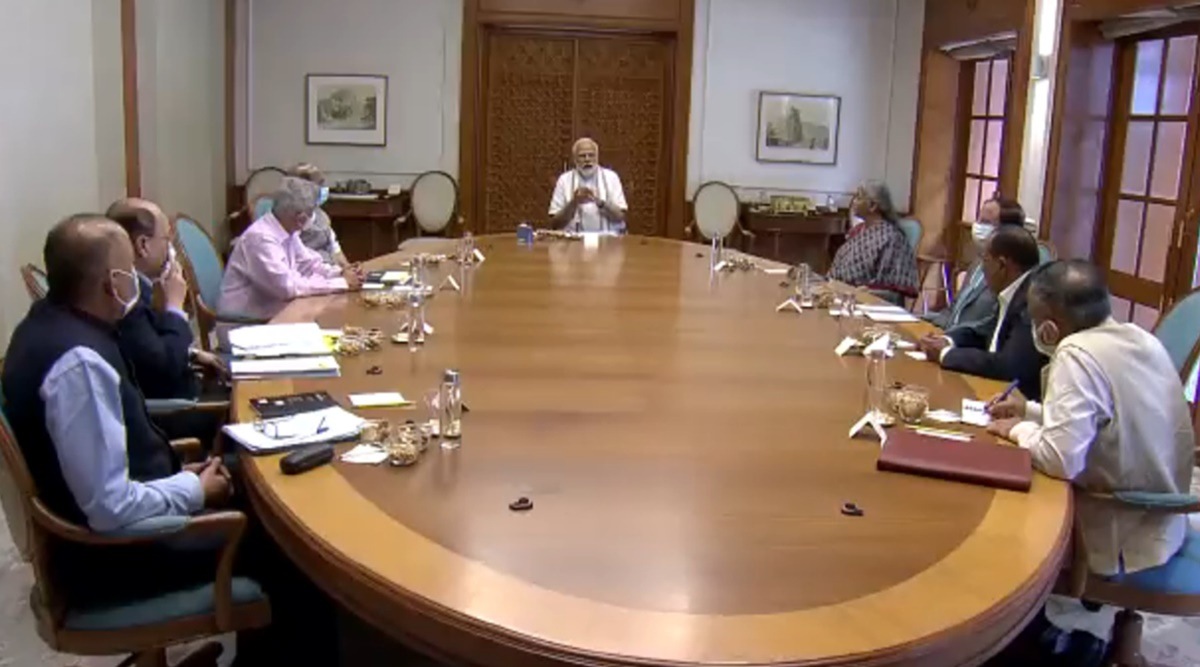 A screengrab from PM Narendra Modi's meeting on Sunday.
A screengrab from PM Narendra Modi's meeting on Sunday. Prime Minister Narendra Modi headed a meeting with his top ministers and bureaucrats on Sunday afternoon over the ongoing war in Ukraine and its impact on India.
The meeting was attended by Defence Minister Rajnath Singh, External Affairs Minister S Jaishankar and Finance Minister Nirmala Sitharaman. The officials who were part of the meeting included National Security Adviser Ajit Doval, Cabinet Secretary Rajiv Gauba, PM’s Principal Secretary PK Mishra, Defence Secretary Ajay Kumar and Foreign Secretary Harsh Vardhan Shringla.
#WATCH Prime Minister Narendra Modi chairs a high-level meeting to review India’s security preparedness and the prevailing global scenario in the context of the ongoing conflict in Ukraine pic.twitter.com/fgKK6Tc7eP
— ANI (@ANI) March 13, 2022
Sources said that the “high-level meeting” was called by the Prime Minister “to review India’s security preparedness, and the prevailing global scenario in the context of the ongoing conflict in Ukraine”.
Since Russia invaded Ukraine on February 24, New Delhi’s primary concern had been to evacuate the 20,000-odd Indian nationals stuck in various cities, many of whom found their way to the borders to enter the neighbouring nations. Most of the Indian nationals were medical students.
However, another concern within the establishment is supply of weapons as most of what India imports are of Russian origin. A week ago, Defence Minister Singh had met three service chiefs to take stock of the situation, vis-à-vis, pending Russian weapons imports, delivery and reserves of spares, and the maintenance of the ones.
While officials within the defence establishment have assured that the armed forces have spares for more than six months as stocks were renewed owing to the ongoing standoff with China in eastern Ladakh since May 2020. With multiple nations across the world having imposed sanctions on Russia, it might get difficult for India to ensure a steady supply of the spares.
From fighter jets, tanks and submarines, to air defence systems, frigates and rifles, more than 60 per cent of the weapons available with Indian Armed Forces are of Russian origin. Many of these weapons also have Ukrainian components, including missiles and gas turbines for warships.
India has already signed agreements worth over $12 billion with Russia for some significant weapons to be delivered in the coming years. In the short term, both Indian and Russian sides have assured that the delivery of the four of the five S400 Triumf air defence units that the country had bought in 2018 will continue as per schedule. There could be some delay, but that, too, is unlikely.
Apart from that, India is waiting for the delivery of two Talwar-class frigates from Russia, for which Ukraine had supplied the gas turbines. Ukraine was also supposed to supply gas turbines for two more such frigates, which will be built in India though.
India is also getting two nuclear ballistic submarines on lease from Russia, Chakra 3 and Chakra 4, the first of which is expected to arrive in 2025.
All these projects could be jeopardised under the threat of sanctions. While the United States had been lenient with India in imposing sanctions under their 2017 law Countering America’s Adversaries Through Sanctions Act (CAATSA), but in the changed global situation, there are concerns that the US may not be as tolerant as India continues to buy sophisticated weapons from Russia.
While India has been trying to expand its base of buying weapons, Russia has been for decades India’s largest defence exporter, and India has bought weapons worth nearly US$ 35 billion in the last 20 years from it.
While most people in the Indian defence establishment do not doubt Russia’s capacity to deliver the weapons or provide spares, how to pay for them, circumventing the global sanctions, will be tricky. As the West tries to isolate Russia, cutting it off from the global SWIFT system, and most western banks shutting down their Russian operations, the Reserve Bank of India has asked Indian banks to explore other avenues.
However, officials within the defence establishment maintain that it is too early to take a call on what kinds of issues Indian forces might face in the long run because of the conflict and the sanctions. But the situation has once again put India’s reliance on Russia for weapons under the spotlight.
- The Indian Express website has been rated GREEN for its credibility and trustworthiness by Newsguard, a global service that rates news sources for their journalistic standards.

